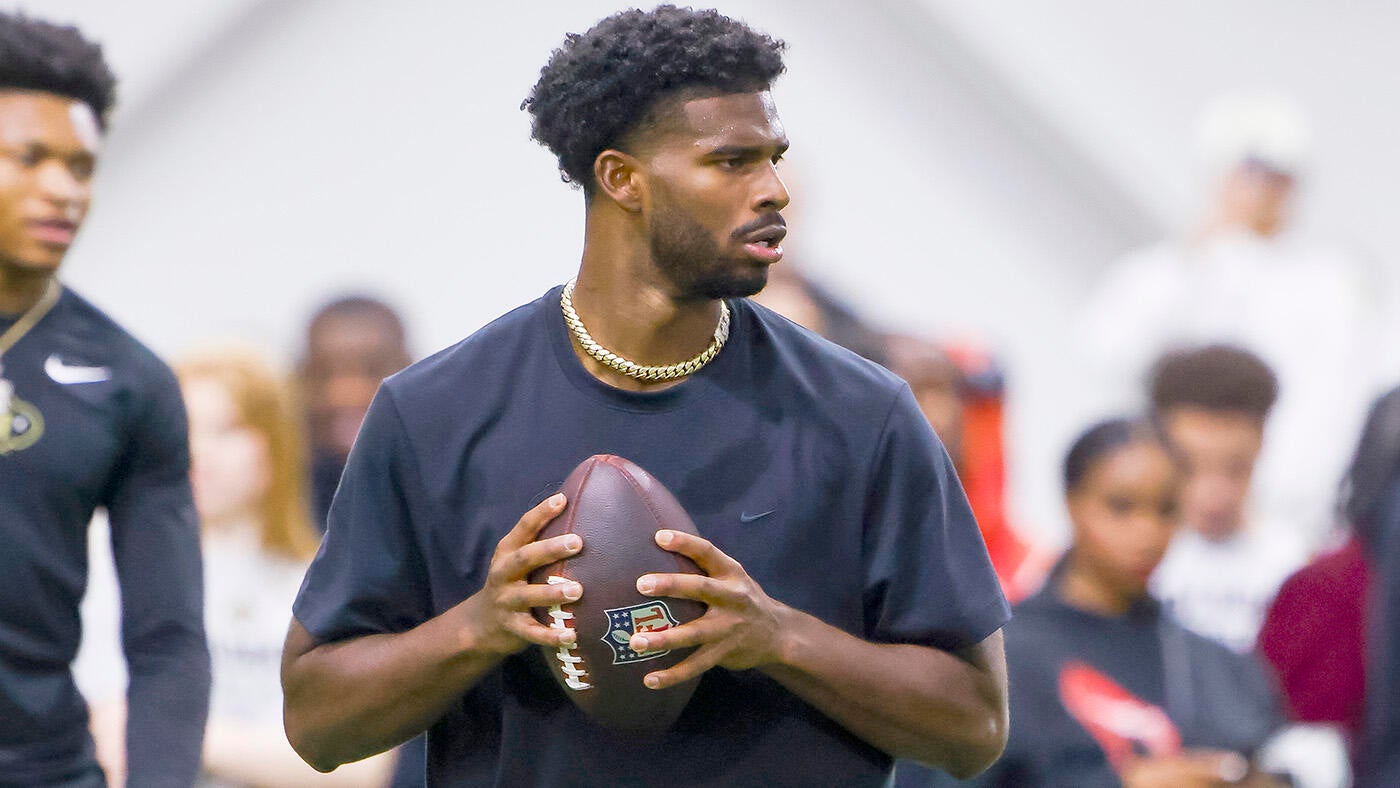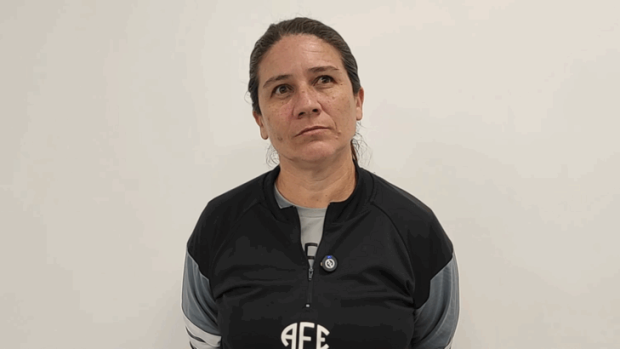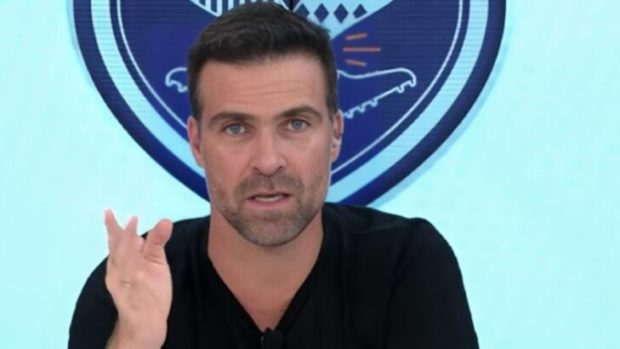

Shedeur Sanders and his father, Deion, made a habit of touting destiny during the Colorado quarterback’s fateful 2025 NFL Draft weekend. Passed over by big-market franchises in the top five? No problem; Shedeur was destined for a better team anyway. Unclaimed after the entire first round? Unbelievable, sure, but it must have happened for Shedeur’s benefit. Overlooked again and again and again, all the way until pick No. 144 in the fifth round, on the final day of the draft, by the same Cleveland Browns who chose another quarterback over Sanders two rounds earlier? Chalk it up to God’s plan.
There is something admirable about taking such blows in stride — trivial as they may be in the grand scheme of life. After all, the knock on the Sanders name has always been that the family is too showy. And that predates Shedeur himself. Dad was one of the premier playmakers in all of sports during his heyday at the dawn of the 1990s. Deion was “Prime Time,” the rare athlete who more than backed up his merciless confidence, establishing a brand across not one but two professional sports before the term even existed among contemporary stars. In many ways, the father is still a larger presence than the son, with Deion literally coaching Shedeur at Colorado, a program elevated to reality-TV royalty thanks to their clan.
Yet it’s also what makes their draft-day perspective difficult to dissect: When Deion and Shedeur repeatedly embrace the latter’s dramatic fall as simply a divine measure, are they ignoring the screaming signs that maybe, just maybe, the glitzy authority with which they operate is not conducive to leading a team of grown men? Or that maybe Shedeur isn’t nearly as gifted and transcendent — both physically and personally — as he and Dad publicly proclaimed, and as their name suggests?
Or are they just genuinely built to weather the storms that plenty of others cannot? Are they truly set apart? Is Shedeur’s quiet, respectful, even anticlimactic entry to Cleveland’s crowded quarterback room evidence that he, too, can accept lesser stardom than expected?
The truth is complicated. No one really knows. In fact, it’s borderline irresponsible to speculate on the matter. The Sanders may have chosen, sought and protected a constant public-facing presence. Look no further than Shedeur’s custom-built draft room, which didn’t quite get the first-round limelight his documentary crew was expecting, despite boasting walls with labels of “Legendary” and Sanders logos doubling as dollar-bill symbols.

Still, they’re people. They’re a family. They’re trying to maximize their moment. And there certainly isn’t anything wrong with embracing rather than fighting unforeseen hurdles. Not once, remember, despite all the hoopla of both the media and Sanders’ own camp, did Shedeur himself throw a pity party throughout draft weekend, scolding the clubs who said thanks but no thanks. He kept watching and waiting, insisting his head wasn’t drooped, and that he would stay level regardless of the outcome. That is a telltale sign of championship-level resolve, provided it’s continually practiced and not just preached.
All that said, it’s possible, if not probable, that Sanders’ slide, which plenty have understandably deemed an embarrassing occurrence for such a well-known and self-hyped name, was one of the best things that could’ve happened to the 23-year-old quarterback.
The talent questions are fair, and frankly, they figure to determine Sanders’ NFL arc more than anything. While the young man was productive in college, showcasing pro-level touch as a traditional pocket passer, 32 NFL teams also deemed his upside questionable enough to leave him untouched until Day 3 of the draft, which is typically reserved for backups and bottom-of-the-roster projects. So, at the end of the day, if Sanders simply doesn’t possess the requisite arm strength or mobility or decision-making to elevate a lineup of NFL talent, then that’s that. The Browns won’t really have many regrets about the resources used to take the swing.
If, however, Sanders does have enough tools to make it as a starting quarterback in the NFL, let alone a difference-maker, it stands to reason that his tumble to Cleveland could work wonders for him.
Start with the team fit: The Browns may be one of the league’s most dysfunctional organizations when it comes to identifying, acquiring and cultivating quality quarterbacks, but the alternatives for Sanders weren’t exactly pipe dreams, either. The perpetually rebuilding New York Giants? The water-treading New Orleans Saints? The wild-card-capped Pittsburgh Steelers? Landing behind an established star on a vaunted contender (i.e. the Philadelphia Eagles) would’ve been ideal. But at least in Cleveland, where the Browns have stockpiled all kinds of quarterbacks to make up for their Deshaun Watson misfire, there is both 1.) an incredibly low bar to clear, 2.) a clear path to a long-term job, and 3.) a lack of pressure to make an immediate difference, given the presence of veteran placeholders like Joe Flacco and Kenny Pickett.
That’s not even accounting for team leadership; Browns coach Kevin Stefanski may not have a pristine record thanks to his eroding marriage to the uneven and oft-unavailable Watson, but he’s held in high regard across the NFL for the work he’s done with other pocket passers, including Flacco and Kirk Cousins. Stylistically, Sanders projects as a logical fit for his system, operating best from inside the pocket. And again, there is a dual benefit to beginning his career in such a crowded room: There is an opportunity for genuine competition and/or development alongside more proven NFL arms, without the once-anticipated burden of meeting inflated expectations, and “saving” Cleveland as the handpicked hero.
And then, of course, most of all, there’s the humility piece. No matter what Shedeur and his Hall of Fame father say to the cameras, it’s hard to believe the NFL’s collective stiff-arm of Sanders on draft weekend won’t change the young quarterback in some way, shape or form. Again, maybe the attitude — the perceived entitlement, which reportedly seeped into pre-draft interviews that cost Shedeur some respect among NFL leaders — will only harden. It’s easier, after all, to double down than work through warts.
But if the interpersonal approach, the work ethic, the commitment to detail, the actions of Sanders both in front of the lens and behind closed doors are kicked into a higher, team-first gear because of what transpired on draft day, then how isn’t this a minor victory for the Sanders camp? What was lost in celebratory recognition might be gained in long-term motivation. Sanders, again, has never run from his celebrity; he even respectfully expressed frustration to Cleveland reporters, upon his Browns arrival, with those wanting him to be “ashamed” of his father’s fame and influence.
Yet it’ll probably be hard for Shedeur to look at the literal draft results, which are black and white and tell him that plenty of teams did not want any part of him despite his genes and swagger, and square those with any leftover sense of, “I deserved better.” Does it mean all those NFL teams were right to evaluate him that way? Does it mean certain coaches and scouts and executives were completely fair in holding his name or his confidence against him? Absolutely not. Teams are wrong all the time, and sometimes for ludicrous reasons that have to do with their own egos. That, however, is besides the point.
Fair or not, there is no “deserved” anymore. There is just reality, which says to Shedeur Sanders that he is, at present, the fourth-string quarterback of the Cleveland Browns. Even that isn’t guaranteed. If that doesn’t serve as a healthy lessening of whatever sense of self may or may not have affected his draft stock, then nothing will.
Is it all a mark of destiny? A greater plan, disguised as a temporary setback? Or a cold bucket of truth for a family that had grown a bit too comfortable with its spotlight? The ball is back in their court.
This news was originally published on this post .











Be the first to leave a comment